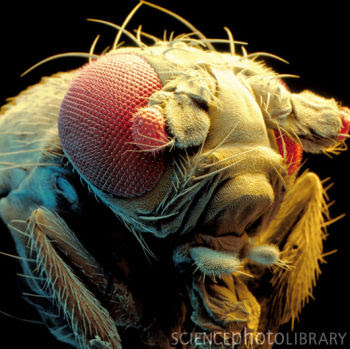 |
| This mutant fruit fly has two small ectopic eyes in the place of antennae, seen here between the large red compound eyes. PHOTO CREDIT: EYE OF SCIENCE LIBRARY. |
ME: "Did you see there was a neat article in ... "
NEIL: "I read it."
He was, as usual, short on words and way ahead of me.
The article, "Jeepers! Creepy Peepers!" appeared in the April 3, 1995 issue of Time and described the latest scientific adventures of researches from the University of Basel in Switzerland.
In a "serious effort to understand how nature fashions something as magnificent as an eye," these scientists created a swarm of fruit flies that had multiple eyes -- not just on their heads. These gnats sprouted eyes on their legs, antennae, wings -- the article says some of these test-tube flies had as many as 14 eyes.
Fourteen eyes! I find that as repulsive as it is intriguing,
I guess it could be that Neil inherited his interest in science from me. After all, I've always been one to linger just a little too long at circus sideshows featuring bearded women and dog-faced boys.
Anyway, I was just wondering what Neil thought of the whole thing. So I asked.
ME: "So, Neil. What did you think?"
NEIL: "I don't really get it. What's the point?"
Well of COURSE Neil didn't get it. He hadn't lived LONG enough to get it. But this mother of four and student of life saw the possibilities, even then. I understand the value of a mom genetically predisposed to actually having eyes in the back of her head, which is how I know those Alpine developmental biologists are standing in some mighty deep and fertile pay dirt.
First, of course, it helps if you understand the origin of this scientific breakthrough.
As the article explained, it seems there is a gene known as eyeless. Fruit flies lacking this gene don't develop eyes. That's why the gene is called eyeless. (And you thought science was so technical.) So they take these eyeless genes, insert them into teeny tiny fruit fly embryos and -- poof! It's a family of bugs with more eyes than Mississippi.
The thing is, the experiment worked just as well when they tried it with an eye-related gene from a mouse instead of the eyeless fruit fly gene. The result was the same: Fruit flies with multiple eyes.
This is amazing news for all of us.
For scientists, it suggest that mouse genes and fly genes are so similar that they must share a common ancestor -- a "sea-dwelling worm that lived 500 million years ago."
To molecular biologists, it means we are all basically just big flies.
And while I'm not certain how you go from mice and fruit flies to prehistoric worms, I do see the mammal /worm connection. It's believable, even from a layperson's point of view.
After all, haven't we all met our share of people we could accurately refer to as sea-dwelling worms?
But what makes this even more amazing news is that, with just a little imagination, science can use this "eyeless" research to benefit the entire human race.
For example, you know that guy who cut you off in traffic yesterday? The one you called "brainless?" It's not what you really called him, but it's what you meant. Scientists could simply isolate his brainless gene and -- poof! Before you know it, a new and improved breed of driver is born with built-in common road courtesy AND the ability to parallel park.
Or that person you just phoned for assistance at your favorite utility company? The one who was rude? The one who kept you on hold for five minutes only to disconnect you? One successful Swiss-scientist procedure on her tactless gene and you are practically guaranteed a Utopian world where people who answer business phones are never rude.
But it doesn't stop there, folks.
Suppose your kids won't help around the house. Get some professional gene splicers to isolate their choreless gene and before you know it, a generation of children is born instinctively beating each other with brooms for first dibs on household chores.
You say your husband hasn't sent you flowers or surprised you with reservations at a nice restaurant since -- well, he's just never done it? It's not really his fault. It's that damned romanceless gene. Send him off to the University of Basel so they can reconfigure his DNA.
Oh sure -- it will take a generation or two for romantic husbands to flourish. But it's worth the wait.
And think of it this way: While you're doing your part to create perfect husbands for your children's children, imagine, just for fun, how it would feel to have the following conversation at a party:
PARTY GUEST: "Where's your husband these days? I haven't seen him around."
YOU: "Him? Oh, he was a real nice guy, but he wasn't genetically predisposed to romance. So I donated him to science.
No comments:
Post a Comment